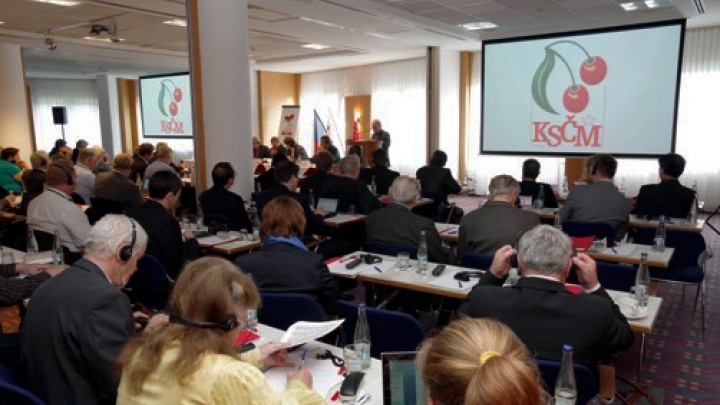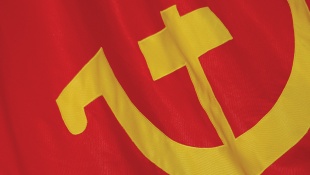Dear Comrades,
Fraternal greetings from the Portuguese Communist Party.
We are participating in this conference in the spirit of the fraternal relations that exist between the PCP and the CPBM, with the conviction that it will represent a useful exchange of views and a contribution for a common or convergent action between our parties.
The proposed theme focuses on Europe, but I believe that it is useful to approach it in a broader context.
1. From the PCP's point of view, the international situation is marked by four main features: 1) The consequences of the disappearance of the USSR and of the defeats of socialism, and the counter-offensive of exploitation and aggression by imperialism ; 2) the deepening of the structural crisis of capitalism which includes the profound and prolonged cyclical crisis triggered in 2008 in the US and the crisis in, and of, the European Union; 3) a gigantic process of realignment of forces, in which the relative decline of the US (and the G7 powers) and the economic rise of China (and of all the BRICS) are relevant factors; 4) the continuing resistance and liberation struggle of the workers and peoples, namely in Europe, which - although not yet at the level required by the offensive of big capital - is a reality that must be valued and which has resulted in important advances, particularly in Latin America.
2. We fight in times of great instability and uncertainty, in which it is increasingly clear that the most reactionary and aggressive imperialist sectors look at fascism and war as a "way out" from the crisis of capitalism. In Europe, the imposition of a fascist regime in Ukraine and the militaristic escalation of confrontation with Russia is particularly disturbing. There is a real danger of a new war of catastrophic proportions. The lessons of World War II must not be forgotten.
But war is not inevitable. It is the responsibility of the Communist parties to strengthen their internationalist cooperation with the certainty that the struggle for peace and against fascism and war and the struggle for social progress and socialism are interconnected and that the greatest contribution that each people can give to the anti-imperialist struggle and the universal cause of peace and social progress is to advance the liberation struggle in their own country.
3. In Portugal, the 1974 April Revolution brought the Portuguese people great revolutionary achievements which, although diminished and even destroyed, continue to inspire the struggle of the Portuguese people. Thirty nine years of right-wing policies and twenty nine years of integration within the EEC/EU, which include the aggressive adjustment programs of the "troika", have led the country to a very serious situation of impoverishment, of destruction of the productive tissue, of demolition of the social functions of the State, of national submission and increasing curtailment of democracy. The PCP fights for a patriotic and left-wing alternative that breaks with the policy followed by PS, PSD and CDS and the external constraints imposed by the EU and the Euro. The forthcoming Autumn elections are an important opportunity to advance in this direction. But what is essential is the development of the mass struggle and the strengthening of the PCP. It is on these two tasks that the PCP has focused the bulk of its forces, having always present its “Programme for an advanced democracy – the values of April in Portugal's future”.
5. The definition of social and political alliances is certainly one of the most important issues facing the activity of Communists.
The development of capitalism, with an unprecedented concentration of economic power and of political power, vastly increases the field of social classes and strata which are interested in liquidating the power of the monopolies and of imperialism. It creates contradictions and tensions that have often given rise to great outbursts of discontentment. But such outbursts and the political movements which they sometimes give rise to, are ephemeral and inconsequential if not accompanied by a clear perspective of progressive and revolutionary transformation and are easily reclaimed by the forces of capital. The role of the organised working class, of the Communist parties and of the class-oriented trade unions thus proves to be of crucial importance to give discontentment and social "resentment" a coherent course towards transformation.
The PCP defends for Portugal a patriotic and left-wing alternative and there are those who ask if we include the Socialist Party within this alternative. No, we do not include it, due to its convergence and alliance with the reactionary forces during thirty nine years of right-wing policies. As in other countries, the PS claims to be and is presented as "left-wing", but the PCP does not assess any political force by its label, but rather by the concrete place which it occupies in the field of the class struggle. The responsibilities of social-democracy in the worsening of the masses' living conditions and of the international situation are very serious.
6. It is based on these more general assessments that we view the activities of the Communist parties in Europe we wish to stress some issues:
- In Europe too, the national arena of struggle is decisive. The idea that in times of imperialist globalization, social transformation can only be conceived at a supranational level and that the national arena has became obsolete, has caused (and still causes) harm to the Communist movement because leads to an underestimation of the issue of national sovereignty and of the struggle against impositions by transnational capital and the major powers, leaving room for the development of reactionary petty-bourgeois nationalism.
- At the same time, the consideration that common problems exist and the development of processes of cooperation and capitalist integration in Europe, makes it increasingly necessary to strengthen internationalist cooperation and solidarity. When the ruling classes in each country closely concert their action against the labour movement and progressive forces, it becomes more necessary to find appropriate ways of articulating the activity of Communists and of these with other truly left-wing forces, around common goals.
-The existence of the European Union (not to mention NATO) poses particular demands on the joint action of Communists. Historically, the issue of European capitalist integration has been a serious factor of cleavage and division among European Communist parties. With the illusion that the EU would be a counterweight to the hegemonic ambitions of the US and would defend the "European social model" vis-a-vis the neo-liberalism of the "US model" - points of view which were prominently defended by "Euro-communism" several Communist parties lost sight of the class nature of the EU. As experience has shown the European Union has always evolved in a neo-liberal, militaristic and federalist direction, with an ever-closer relationship with the USA and NATO.
The struggle against the EU of big business and of the major powers is a fundamental task of the Communists. And it is not a question of correcting "liberal excesses" or its "austerity policies" as proposed by the so called “left-wing europeanism”. The EU is non-reformable. It is a question of breaking with this capitalist construction, opposing it with another Europe of peace, progress and cooperation among sovereign States with equal rights. There is no possibility of carrying out in Portugal a policy of development in line with the country's interests and the will of the Portuguese people, without breaking with the impositions of the Euro and of European capitalist integration. From our point of view, what is happening with the brutal strangulation of Greece confirms the position of the PCP.
- The different standpoints regarding the EU should not prevent the necessary cooperation among Communist parties, and of these with other left-wing forces that clearly distance themselves from social democracy, on concrete issues ranging from the defence of social and labour rights that are being violently attacked, to the TTIP (Transatlantic Trade and Investment Partnership), from the rejection of securitarian measures which undermine fundamental freedoms and democratic rights under the pretext of "fighting terrorism", to the firm opposition to militarism and aggression against other peoples.
It is in this context that, beyond the specific initiatives of Communist parties, the PCP participates in the European United Left/Nordic Green Left Group in the European Parliament.
The diversity of situations in each country determines equally diverse objectives and immediate tasks. There are also different analyses on important issues of theory and the history and strategy of the international Communist movement. But this should not hinder cooperation. For our part, without ignoring the importance of such differences and even disagreements, we believe that what unites us should be valued, and we promote common or convergent action around issues of common interest, such as the celebrations of the 70th anniversary of the Victory over Nazi-fascism with the joint position adopted by numerous Communist parties.
8. Comrades, The great leap backwards that the defeats of socialism in the late twentieth century represented, and the complexity of the current situation, should not lead us to lose sight of the historical perspective and to forget that the present era is the era of transition from capitalism to socialism, which was inaugurated by the October Revolution.
Imperialism is on the offensive. It is still powerful and shows unexpected ability to adapt and recover. But it is undermined by insurmountable contradictions, incapable of fulfilling the aspirations of the workers and of solving Humanity's major problems. The socialist alternative is more relevant than ever.
It is true that the Communist and revolutionary movement has not yet recovered from the blows it suffered. Globally speaking, the situation is still one of resistance and of collecting forces. But the class struggle is a reality, great dangers coexist with great potential for progressive and revolutionary developments.
In such a complex and uncertain situation, what is most important for the PCP is to reject the ideology that considers capitalism the final historical system, is to defend and affirm our Communist identity and the goal of a socialist society, is to rely on the working class and the masses and on the powerful force of their organised struggle. There is no transforming path that can by-step the persistent development of the struggle in each country and the strengthening of the common or convergent action of Communist parties.


